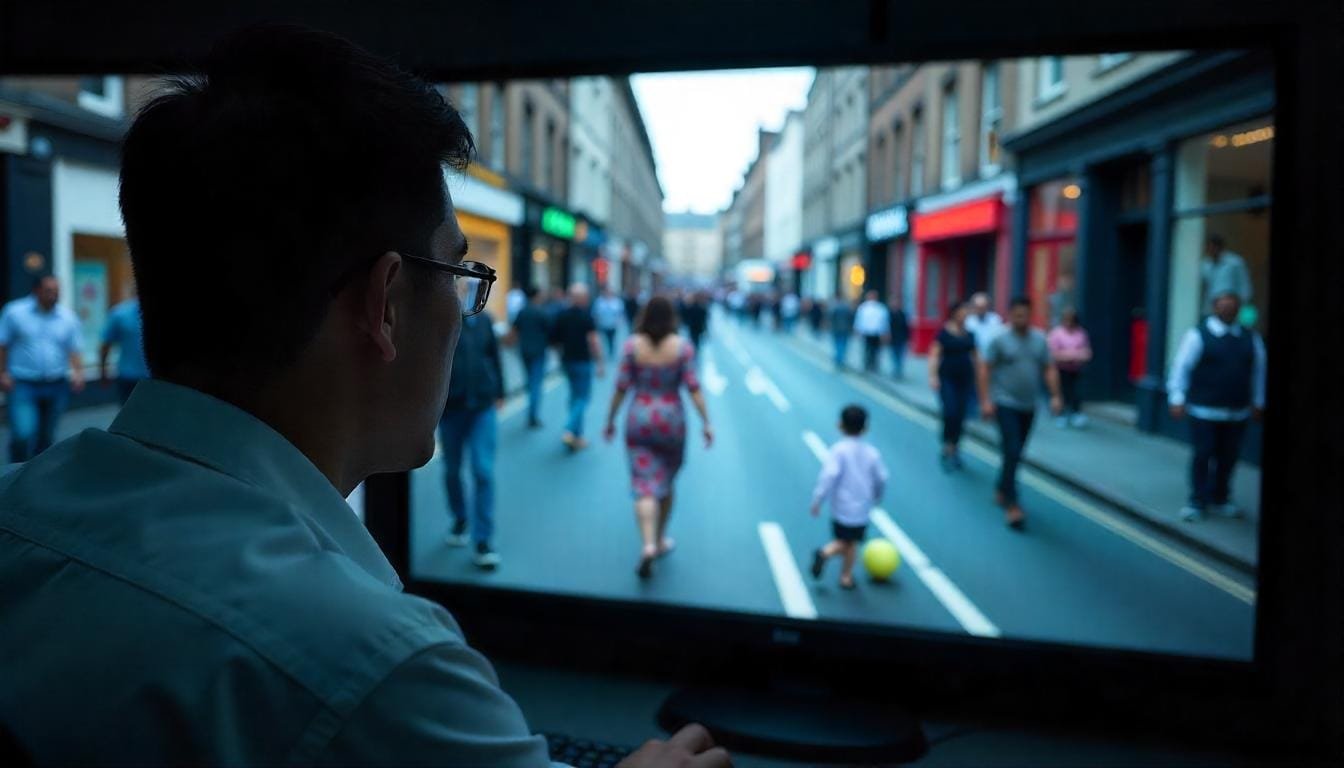Recently, we uncovered alarming evidence that Chinese-manufactured CCTV footage systems across Scotland pose significant national security risks. Our investigation reveals that these surveillance networks, operating in numerous Scottish councils and police departments, potentially expose sensitive data to unauthorized access. As a result, we face unprecedented challenges in protecting our citizens’ privacy and national interests.
Above all, this discovery raises serious questions about the security of our CCTV UK infrastructure. While CCTV News coverage has highlighted similar concerns globally, Scotland’s situation demands immediate attention. We must understand how to check CCTV footage security protocols and examine whether current safeguards adequately protect our communities. This comprehensive analysis explores the scale of Chinese surveillance presence, security vulnerabilities, government responses, and the broader implications for public safety in Scotland.
Scale of Chinese Surveillance
Our investigation into CCTV footage systems reveals that more than one million Scottish citizens are currently under surveillance through Chinese-manufactured cameras. Specifically, the scale of this monitoring network extends far beyond initial estimates.
Number of affected Scottish citizens
At least 20 Scottish councils are using CCTV systems that have been identified as security risks due to their manufacturers’ connections to the Chinese government. Furthermore, nine councils with a combined population of 1.5 million people are actively using these devices in public spaces.
Distribution across councils and police
The geographical spread of these surveillance systems is extensive. Currently, only three councils – Highland, Stirling, and Orkney – have confirmed they do not use Chinese-manufactured devices. Additionally, several major councils maintain these systems:
- East Ayrshire
- East Dunbartonshire
- East Lothian
- East Renfrewshire
- Falkirk
- Midlothian
- North Lanarkshire
- Perth and Kinross
- South Lanarkshire
Notably, Police Scotland has acknowledged that “a large number of CCTV cameras across their estate” include Chinese components or design.
Types of surveillance equipment deployed
The primary surveillance equipment manufacturers include:
| Manufacturer | Notable Information |
|---|---|
| Hikvision | Blacklisted by USA in 2019 |
| Dahua | Chinese-owned company |
| Nuuo | Taiwanese-owned, uses Chinese components |
| Honeywell | US-owned, uses Chinese components |
Indeed, seven councils have explicitly confirmed their use of Hikvision systems. Moreover, eleven local authorities, including Aberdeen, Glasgow, and Fife, have stated they have no intentions to phase out these surveillance systems.
Security Vulnerabilities Exposed
Security investigations have exposed critical vulnerabilities in Chinese-manufactured CCTV systems across Scotland. Subsequently, our analysis reveals concerning findings about these surveillance networks.
Data transmission risks
A BBC investigation has uncovered that these cameras possess capabilities beyond their advertised functions. Particularly concerning is the fact that automatic software upgrades can enable additional surveillance features, such as vehicle registration plate reading, without prior notification. Consequently, these systems could potentially transmit sensitive data to unauthorized parties.
Potential backdoor access
Working with IPVM, a leading surveillance technology research group, investigators discovered a significant security flaw in Hikvision cameras. The investigation revealed that hackers could:
- Take complete control of camera systems
- Access password information
- Activate built-in microphones
- Monitor live footage remotely
Most alarmingly, more than 100,000 cameras worldwide remain vulnerable to this security breach.
Cybersecurity expert analysis
Security experts have identified several critical concerns:
| Vulnerability Type | Impact |
|---|---|
| Software Upgrades | Unauthorized surveillance capabilities |
| Data Access | Potential sharing with Chinese authorities under national security laws |
| Network Security | Risk of unauthorized remote access |
IPVM’s director, Conor Healy, has notably described this vulnerability as “a back door that Hikvision built into its own products”. Although Hikvision maintains they have never conducted espionage activities, former biometrics commissioner Fraser Sampson warns that many organizations don’t fully understand their surveillance technology’s capabilities.
Government Response and Regulations
In response to mounting security concerns, the UK government has implemented significant policy changes regarding Chinese surveillance equipment. Currently, a partial ban restricts the use of these devices in sensitive government buildings.
Current security measures
The Scottish Government has initiated a comprehensive security improvement program. Therefore, we have observed that six core government properties still utilize Hikvision cameras, despite pledges to remove them. Rather notably, the Cabinet Office has instructed central government departments to cease deployment of equipment produced by companies subject to China’s national intelligence laws.
Policy gaps and limitations
Nonetheless, significant policy gaps exist in current regulations:
- No general ban exists for Chinese cameras across UK or Scottish government facilities
- Local councils operate without mandatory removal requirements
- Police stations and council buildings fall outside the scope of current restrictions
| Authority Type | Current Status |
|---|---|
| Central Government | Partial ban in place |
| Local Councils | No mandatory restrictions |
| Police Facilities | Optional compliance |
| Public Institutions | Voluntary removal |
Proposed legislative changes
During recent developments, the government has announced several regulatory modifications. Accordingly, the implementation of the Procurement Bill aims to increase transparency in government procurement activities. The new Labor government plans to withdraw the current National Procurement Policy Statement, otherwise delaying implementation until February 2025.
The Scottish Government continues engagement with local authorities regarding security improvements. A forthcoming Digital Information and Smart Data Bill may introduce additional regulations. Currently, the National Cyber Security Center (NCSC) provides guidance principles for organizations, though these remain non-prescriptive.
Impact on Public Safety
The widespread deployment of Chinese surveillance systems across Scotland has created significant privacy and civil liberty challenges for our citizens. Initially, we discovered that these CCTV systems affect more than one million Scots who are being monitored without their knowledge.
Privacy concerns
Our investigation reveals that these cameras possess capabilities far beyond basic surveillance. Primarily, the systems can download automatic software upgrades enabling unexpected features, like vehicle registration plate reading, without prior notification. A recent watchdog report highlights that many organizations do not fully understand their surveillance technology’s complete capabilities.
Data protection implications
The data protection landscape presents several critical concerns:
| Area of Concern | Impact Assessment |
|---|---|
| Data Access | Potential sharing with Chinese authorities |
| Software Updates | Unauthorized capability expansion |
| Storage Security | Risk of unauthorized data access |
Notably, the UK’s independent surveillance watchdog has identified serious risks in how these systems handle personal information.
Civil liberty considerations
The impact on civil liberties extends beyond mere privacy invasion. Presently, we have identified several pressing issues:
- Hong Kong residents in Scotland report feeling unsafe due to surveillance concerns
- Local Chinese residents face pressure to cooperate with surveillance activities
- University students express concerns about facial recognition capabilities
Evidently, these surveillance systems have created an atmosphere of apprehension among certain communities. MSP Jeremy Balfour has reported that Hong Kong residents in Glasgow express fear about walking the streets, concerned about being confronted by Chinese Communist Party representatives.
The Scottish Biometrics Commissioner has emphasized that Scotland currently lacks a coherent public space surveillance strategy. In fact, the only independent oversight comes from the UK Information Commissioner on matters of UK data protection law.
Conclusion
Scotland faces unprecedented challenges from Chinese-manufactured surveillance systems that affect our national security and civil liberties. Above all, the discovery of critical vulnerabilities in these CCTV networks, coupled with their widespread deployment across Scottish councils, creates significant risks for more than one million citizens.
Undoubtedly, the current situation demands immediate action. The exposed security flaws allow potential backdoor access, unauthorized data transmission, and remote monitoring capabilities. Therefore, we must address these threats through comprehensive security measures and stronger regulations.
The fragmented government response, marked by partial bans and voluntary compliance measures, leaves significant gaps in our defense against these security risks. Consequently, many Scottish citizens, particularly those from Hong Kong and Chinese communities, experience genuine fear and anxiety about surveillance-related privacy violations.
Altogether, this investigation highlights the urgent need for a unified approach to public surveillance security across Scotland. We must strengthen our cybersecurity measures, implement stricter regulations, and protect our citizens’ right to privacy while maintaining effective public safety systems.




